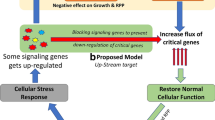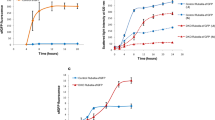Abstract
Recombinant proteins produced in Escherichia coli are often contaminated with endotoxins, which can be a serious problem for their further application. One of the possible solutions is the use of modified strains with reduced lipopolysaccharide (LPS) levels. We compared two approaches to engineering such strains. The first commonly known approach was modification of LPS biosynthesis pathway by knocking out seven genes in the E. coli genome. The second approach, which has not been previously used, was to increase expression of E. coli protein YciM. According to the published data, elevated expression of YciM leads to the reduction in the amount of the LpxC enzyme involved in LPS biosynthesis. We investigated the impact of YciM coexpression with eGFP on the content of endotoxins in the purified recombinant eGFP samples. Both approaches provided similar outcomes, i.e., decreased the endotoxin levels in the purified protein samples.



Similar content being viewed by others
Abbreviations
- LPS:
-
lipopolysaccharide
- OD:
-
optical density
References
Raetz, C. R., and Whitfield, C. (2002) Lipopolysaccharide endotoxins, Annu. Rev. Biochem., 71, 635-700, https://doi.org/10.1146/annurev.biochem.71.110601.135414.
Bos, M. P., Robert, V., and Tommassen, J. (2007) Biogenesis of the gram-negative bacterial outer membrane, Annu. Rev. Microbiol., 61, 191-214, https://doi.org/10.1146/annurev.micro.61.080706.093245.
Yoon, S. H., Jeong, H., Kwon, S. K., and Kim, J. F. (2009) Genomics, Biological Features, and Biotechnological Applications of Escherichia coli B: “Is B for better?!”, in Systems Biology and Biotechnology of Escherichia coli (Lee, S. Y., ed) Springer, Dordrecht, https://doi.org/10.1007/978-1-4020-9394-4_1.
Mamat, U., Wilke, K., Bramhill, D., Schromm, A. B., Lindner, B., Kohl, T. A., Corchero, J. L., Villaverde, A., Schaffer, L., Head, S. R., Souvignier, C., Meredith, T. C., and Woodard, R. W. (2015) Detoxifying Escherichia coli for endotoxin-free production of recombinant proteins, Microb. Cell Fact., 14, 1-15, https://doi.org/10.1186/s12934-015-0241-5.
Kayagaki, N., Wong, M. T., Stowe, I. B., Ramani, S. R., Gonzalez, L. C., Akashi-Takamura, S., Miyake, K., Zhang, J., Lee, W. P., Muszyński, A., Forsberg, L. S., Carlson, R. W., and Dixit, V. M. (2013) Noncanonical inflammasome activation by intracellular LPS independent of TLR4, Science, 130, 1246-1249, https://doi.org/10.1126/science.1240248.
Park, B. S., Song, D. H., Kim, H. M., Choi, B. S., Lee, H., and Lee, J.-Oh (2009) The structural basis of lipopolysaccharide recognition by the TLR4-MD-2 complex, Nature, 458, 1191-1195, https://doi.org/10.1038/nature07830.
Mahalakshmi, S., Sunayana, M. R., Saisree, L., and Reddy, M. (2014) YciM is an essential gene required for regulation of lipopolysaccharide synthesis in Escherichia coli, Mol. Microbiol., 91, 145-157, https://doi.org/10.1111/mmi.12452.
Jiang, Y., Chen, B., Duan, C., Sun, B., Yang, J., and Yang, S. (2015) Multigene editing in the Escherichia coli genome via the CRISPR-Cas9 system, Appl. Environ. Microbiol., 81, 2506-2514, https://doi.org/10.1128/AEM.04023-14.
Klock, H. E., and Lesley, S. A. (2009) The Polymerase Incomplete Primer Extension (PIPE) method applied to high-throughput cloning and site-directed mutagenesis, Methods Mol. Biol., 498, 91-103, https://doi.org/10.1007/978-1-59745-196-3_6.
Dower, W. J., Miller, J. F., and Ragsdale, C. W. (1988) High efficiency transformation of E. coli by high voltage electroporation, Nucleic Acids Res., 16, 6127-6145, https://doi.org/10.1093/nar/16.13.6127.
Cormack, B. P., Valdivia, R. H., and Falkow, S. (1996) FACS-optimized mutants of the green fluorescent protein (GFP), Gene, 173, 33-38, https://doi.org/10.1016/0378-1119(95)00685-0.
Mamat, U., Woodard, R. W., Wilke, K., Souvignier, C., Mead, D., Steinmetz, E., Terry, K., Kovacich, Ch., Zegers, A., and Knox, C. (2013) Endotoxin-free protein production – ClearColiTM technology, Nat. Methods, 10, 916, https://doi.org/10.1038/nmeth.f.367.
Funding
This research was supported by the Russian Science Foundation (project no. 23-24-00080, https://rscf.ru/project/23-24-00080/ [in Russian]).
Author information
Authors and Affiliations
Contributions
P.A.B. and S.A.K. conducted genetic engineering experiments; D.D.Kh. performed bacterial endotoxin assays; K.A.B. and E.N.G. conducted microbiological experiments; V.A.M. purified the recombinant protein; V.N.L. supervised the study; P.A.B., D.D.Kh., and V.A.M. wrote the manuscript.
Corresponding author
Ethics declarations
The authors declare no conflict of interest. This manuscript does not contain description of studies involving humans or animals performed by any of the authors.
Rights and permissions
About this article
Cite this article
Bobrovsky, P.A., Kharlampieva, D.D., Kirillin, S.A. et al. Upregulation of YciM Expression Reduces Endotoxin Contamination of Recombinant Proteins Produced in Escherichia coli Cells. Biochemistry Moscow 88, 1318–1325 (2023). https://doi.org/10.1134/S0006297923090110
Received:
Revised:
Accepted:
Published:
Issue Date:
DOI: https://doi.org/10.1134/S0006297923090110




